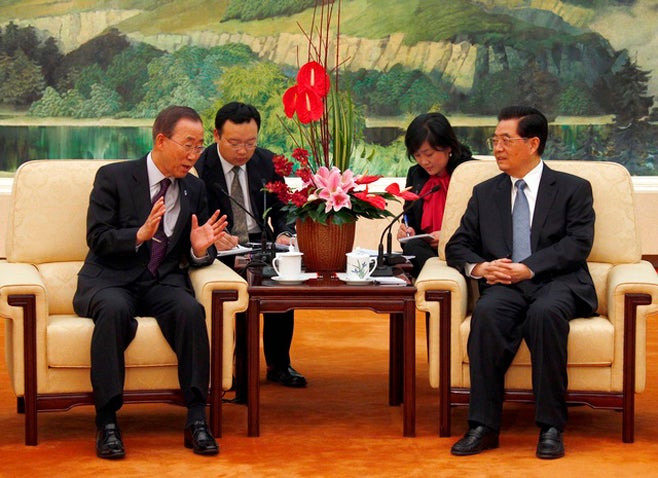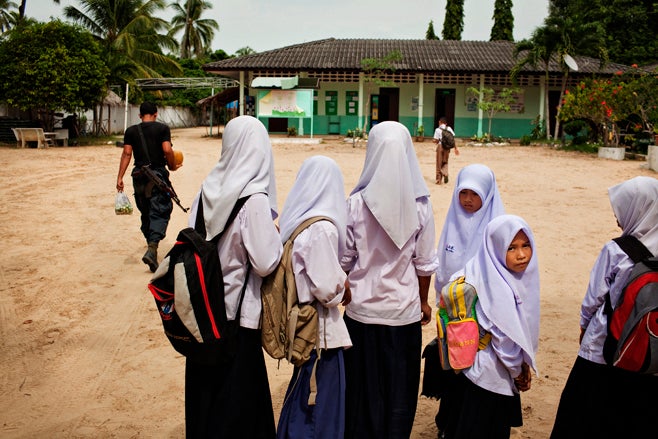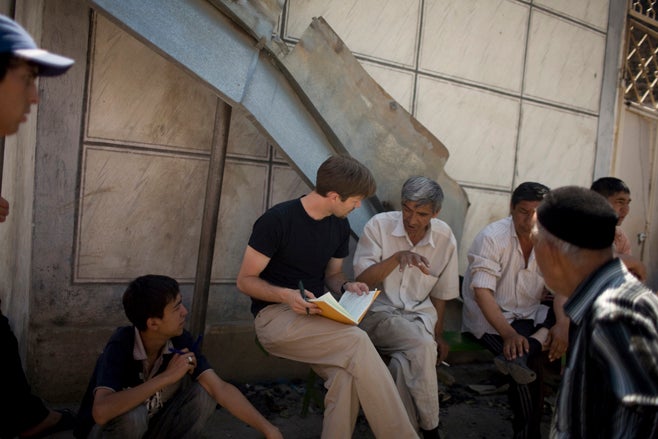Iran's human rights crisis deepened as the government sought to consolidate its power following 2009's disputed presidential election. Public demonstrations waned after security forces used live ammunition to suppress protesters in late 2009, resulting in the death of at least seven protesters. Authorities announced that security forces had arrested more than 6,000 individuals after June 2009. Hundreds-including lawyers, rights defenders, journalists, civil society activists, and opposition leaders-remain in detention without charge. Since the election crackdown last year, well over a thousand people have fled Iran to seek asylum in neighboring countries. Interrogators used torture to extract confessions, on which the judiciary relied on to sentence people to long prison terms and even death. Restrictions on freedom of expression and association, as well as religious and gender-based discrimination, continued unabated.
Torture and Ill-Treatment
Authorities systematically used torture to coerce confessions. Student activist Abdullah Momeni wrote to Supreme Leader Ayatollah Seyed Ali Khamenei in September describing the torture he suffered at the hands of jailers. At this writing no high-level official has been prosecuted for the torture, ill-treatment, and deaths of three detainees held at Kahrizak detention center after June 2009.
On August 2, 2010, 17 political prisoners issued a statement demanding the rights guaranteed to prisoners by law, including an end to their solitary confinement and access to medical facilities. They also complained of severely overcrowded conditions. Reports by international human rights groups indicate that prison authorities are systematically denying needed medical care to political prisoners at Tehran's Evin Prison and other facilities.
Freedom of Expression
Dozens of journalists and bloggers are currently behind bars or free on short-term furloughs. On September 28 blogger Hossein Derakhshan received a nineteen-and-a-half year prison sentence for espionage, "propaganda against the regime," and "insulting sanctities." The judiciary sentenced numerous other journalists, including Isa Saharkhiz and Hengameh Shahidi who were sentenced to three and six years respectively, for crimes such as "insulting" government officials. On June 8 a revolutionary court sentenced Jila Baniyaghoub to a year in prison and barred her from working as a journalist for 30 years.
The Ministry of Islamic Culture and Guidance continued shutting down newspapers and in August directed the press not to publish items about opposition leaders Mir Hossein Moussavi, Mehdi Karroubi, and Mohammad Khatami, the former president.
State universities prevented some politically active students from registering for graduate programs despite undergraduate test scores that should have guaranteed them access. The government initiated an aggressive campaign to "Islamicize" universities, in part by forcibly retiring professors in the social sciences.
The government relied on plainclothes security forces and the Basij, a state-sponsored paramilitary force, to target Shia clerics critical of the government, such as Grand Ayatollah Yusef Sanei, Mehdi Karroubi, and Ayatollah Seyed Ali Mohammad Dastgheib. Ayatollah Kazemini Boroujerdi-whose understanding of Islam calls for the separation of religion and government-entered his fourth year in prison following a Special Court for the Clergy conviction on unknown charges. After years under house arrest and government monitoring, Grand Ayatollah Hossein-Ali Montazeri died in December 2009. Security forces arrested scores of mourners who attended his funeral.
The government systematically blocks websites that carry political news and analysis, slows down internet speeds, jams foreign satellite broadcasts, and employs the Revolutionary Guards to target dissident websites.
Freedom of Assembly and Association
Authorities continued a blanket policy of denying permits for opposition demonstrations. Security forces prevented the Mourning Mothers, whose sons and daughters were killed by security forces during the 2009 unrest, from gathering at Laleh Park in Tehran. Authorities also prevented women's rights activists from publicly petitioning against existing laws or legislation that discriminate against women.
The government increased restrictions on civil society organizations. On September 27 the general prosecutor and judiciary spokesman announced a court order dissolving two pro-reform political parties, the Islamic Iran Participation Front and the Mojahedin of the Islamic Revolution.
Repression of student groups was particularly harsh. Security forces detained scores of members belonging to the Office for Consolidating Unity, including Ali Qolizadeh, Alireza Kiani, Mohammad Heydarzadeh, and Mohsen Barzegar, who were arrested in early November 2010. The Office for Consolidating Unity is a national independent student association that authorities declared illegal in January 2009. In 2010, revolutionary courts convicted Bahareh Hedayat, Majid Tavakoli, and Milad Asadi, members of Tahkim's alumni group, to prison terms ranging from six to eight-and-a-half years on charges that include insulting government authorities.
Death Penalty
In 2009, the last year for which figures are available, authorities executed 388 prisoners, more than any other nation except China. Iranian human rights defenders believe that many more executions, especially of individuals convicted of drug trafficking, are taking place in Iran's prisons today.
Crimes punishable by death include murder, rape, drug trafficking, armed robbery, espionage, sodomy, and adultery. Under intense international pressure, officials suspended the stoning-to-death sentence of Sakineh Mohammadi Ashtiani who was convicted of adultery in 2006. However, they alleged that Ashtiani helped murder her husband. She remains on death row at this writing.
Iran leads the world in the execution of juvenile offenders. Iranian law allows death sentences for persons who have reached puberty, defined as nine years old for girls and fifteen for boys. According to a human rights lawyer who defended many juvenile offenders on death row, authorities executed a juvenile offender named Mohammad on July 10, 2010. There are currently more than a hundred juvenile offenders on death row, including Ebrahim Hamidi, whom a local court sentenced to death for the alleged rape of another boy in 2010. Hamidi was 16 at the time of the alleged crime.
Authorities have executed at least nine political dissidents since November 2009, all of them convicted of moharebeh ("enmity against God") for their alleged ties to armed groups. On January 28 the government hanged Mohammad-Reza Ali-Zamani and Arash Rahmanipour. Although both were arrested prior to the June 2009 presidential election, they were tried as part of the August 2009 mass trials, where they reportedly confessed to planning a deadly 2008 bombing in Shiraz, southwest Iran.
Authorities executed Farzad Kamangar, Ali Heidarian, Farhad Vakili, Shirin Alam Holi, and Mehdi Eslamian by hanging on the morning of May 9 in Evin prison without informing their lawyers or families. Another 16 Kurds presently face execution for their alleged support of armed groups.
Human Rights Defenders
Efforts to intimidate human rights lawyers and prevent them from effectively representing political detainees continued. In September authorities arrested Nasrin Sotoudeh, who represented numerous political prisoners. In November Sotoudeh went on a "dry" hunger strike, refusing to eat or drink anything to protest being held in solitary confinement since her arrest. Mohammad Mostafaei was forced to flee Iran after authorities repeatedly summoned him for questioning and detained his wife, father-in-law, and brother-in-law. Mostafaei represented high-profile defendants such as Sakineh Mohammadi Ashtiani, the woman sentenced to death by stoning, and numerous juvenile detainees on death row. In October 2010, a revolutionary court sentenced Mohammad Seifzadeh, a colleague of Nobel-prize winner Shirin Ebadi and co-founder of the banned Center for Defenders of Human Rights, to nine years imprisonment and banned him from practicing law for 10 years.
Security forces routinely harassed and arrested human rights activists, often without charge. Others were swept up in raids and face charges of attempting to overthrow the government via "cyber-warfare." On September 21 a revolutionary court sentenced Emad Baghi to six years in prison for an interview he conducted with dissident cleric Grand Ayatollah Montazeri several years earlier. Another revolutionary court sentenced Shiva Nazar Ahari and Koohyar Goodarzi, both members of the Committee of Human Rights Reporters, to six years and one year respectively after months of "temporary detention" for alleged national security offenses.
Treatment of Minorities
The government denies adherents of the Baha'i faith-Iran's largest non-Muslim religious minority-freedom of religion. In August the judiciary convicted seven leaders of the national Baha'i organization to 20 years each in prison; their sentences were later reduced to 10 years each. The government accused them of espionage without providing evidence and denied their lawyers' requests to conduct a prompt and fair trial.
Iranian laws continue to discriminate against religious minorities, including Sunni Muslims, in employment and education. Sunni Muslims, about 10 percent of the population, cannot construct mosques in major cities. In 2010, security forces detained several members of Iran's largest Sufi sect, the Nematollahi Gonabadi order, and attacked their houses of worship. They similarly targeted converts to Christianity for questioning and arrest.
The government restricts cultural and political activities among the country's Azeri, Kurdish, and Arab minorities, including the organizations that focus on social issues.
Sexual minorities also face a precarious situation. Law enforcement and judiciary officials discriminate, both in law and in practice, against Iran's vulnerable lesbian, gay, bisexual, and transgender communities. Iran's penal code criminalizes consensual same-sex acts, some of which are punishable by death. During the past few years, a steady stream of LGBT Iranians has sought refugee status in Turkey and are awaiting resettlement in third countries.
Key International Actors
Iran's nuclear program continued to be the center of attention for much of 2010, overshadowing serious concerns regarding the deepening human rights crisis in the country. In June 2010 the United Nations Security Council passed a new round of sanctions against Iran for its failure to comply with previous resolutions on transparency regarding its nuclear program.
During Iran's Universal Periodic Review before the UN Human Rights Council (HRC) in March, Iran rejected 45 recommendations of member states, including allowing the special rapporteur on torture to visit the country; prosecuting security officials involved in torturing, raping, or killing; implementing policies to end gender based violence; and halting the execution of political prisoners.
In October 2010 the UN secretary-general's office released its report on the situation of human rights in Iran, pursuant to UN General Assembly resolution 64/176. The report noted "further negative developments in the human rights situation" in Iran, including "excessive use of force, arbitrary arrests, and detentions, unfair trials, and possible torture and ill-treatment of opposition activists" following the June 2009 election.
In April Iran withdrew its bid to gain a seat on the HRC after strong international opposition. However, it did gain a seat on the Commission on the Status of Women. During the June session of the HRC, 56 states joined a statement expressing concern over "the lack of progress in the protection of human rights in Iran, particularly since the events surrounding the elections in Iran last June." In December 2009 the UN General Assembly passed a resolution criticizing Iran's human rights record.
On September 29, 2010, the Obama administration announced "human rights sanctions" against eight high-level Iranian officials, including individuals from the ministries of intelligence and interior, the police, the Basij, the Revolutionary Guards, and the judiciary, who were responsible for systematic and serious human rights violations.



